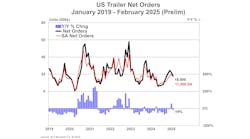In a rite of summer, Congress again will consider a bill to repeal the 12% federal excise tax (FET) on the sale of heavy-duty trucks and trailers.
U.S. Sen. Cory Gardner (R-CO) has introduced S. 3052, a companion bill to the “Heavy Truck, Tractor and Trailer Retail Federal Excise Tax Repeal Act” (H.R. 2946) introduced by Rep. Doug LaMalfa (R-CA) a year ago.
“This burdensome tax creates excessive costs that are passed on to truckers, who play an essential role in maintaining our nation’s economy,” said Gardner. “I was happy to introduce legislation to repeal it.”
Prior to the efforts of the current Congress, similar legislation came and went in 2010 and 2012, and other more recent legislation has been aimed at simply making sure the tax doesn’t increase.
The FET, which was originally imposed in 1917 to help pay for World War I, has grown from 3% to 12% and adds $12,000 to $22,000 on the price of a new heavy-duty truck.
“It is the highest excise tax Congress levies on a percentage basis on any product, including alcohol and tobacco,” said American Truck Dealers Chairwoman Jodie Teuton, vice president of Kenworth of Louisiana and Hino of Baton Rouge. “It’s time for Congress to repeal this tax, and we thank Sen. Gardner for his leadership on this important issue.”
The American Trucking Associations, while generally supportive, notes a certain quandary on the matter: The FET goes toward paying for federal highways—and infrastructure investment is high on the trucking lobby’s list of priorities.
“ATA agrees that the FET is a counterproductive tax that stifles markets for our members and disincentivizes investment in new and safe trucks and equipment,” said ATA Executive Vice President of Advocacy Bill Sullivan. “As policymakers are able to address the shortfall in the Highway Trust Fund, we hope to make a strong case for its repeal. Repeal without replacing the lost revenue in the trust fund is not a policy we support.”
Indeed, as National Trailer Dealers Association President Gwendolyn Brown told TBB when the House version was introduced, getting Congress to come up with a long-term fix for the Highway Trust Fund has been an uphill pull for the trucking industry for more than decade.
“Efforts to make even minor changes to the FET law have met legislative roadblocks due to the enormous size of the tax revenue,” Brown said. “Fair or unfair, the government is collecting a huge amount of money every year under the current tax and any changes that are not revenue neutral have been shot down.”
NTEA likewise supports such legislation, also noting some unintended consequences of the FET, such as customers holding on to less efficient equipment longer because of the growing expense of new trucks.
Similarly, Truck Trailer Manufacturers Association President Jeff Sims said last year that the group has generally supported “nixing the FET” because it’s “a hindrance to buying better, safer equipment.”
Other supporters of the FET repeal include Baker Commodities, Bendix Commercial Vehicles, Daimler Trucks North America, Mack Trucks, Navistar, Recreation Vehicle Dealers Association, Truck & Engine Manufacturers Association, Truck Renting and Leasing Association, and Volvo Trucks North America, according to the ATD statement.











